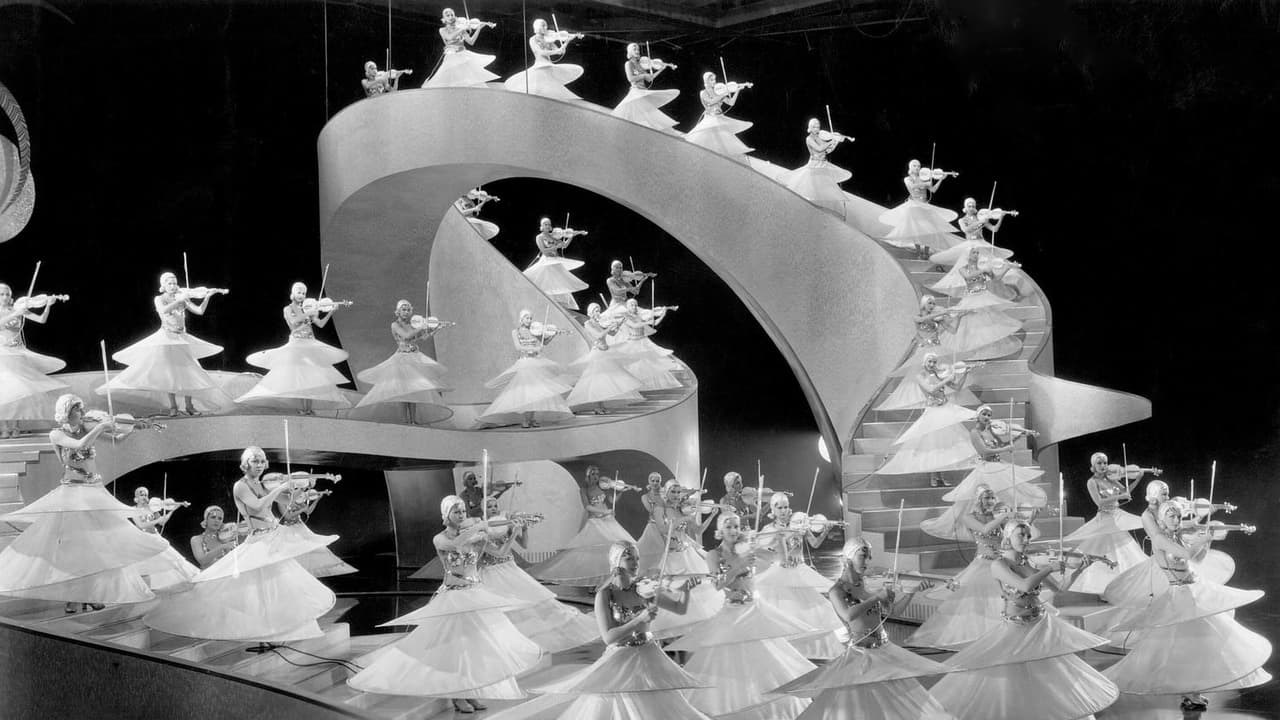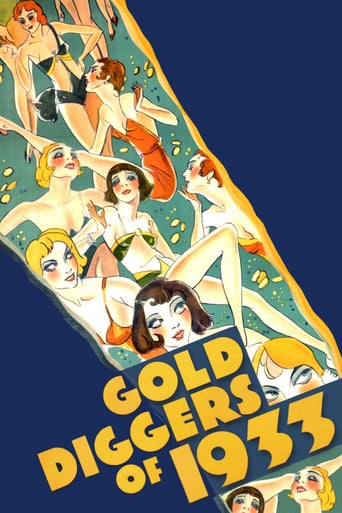

Director: MERVYN LeROY. Screenplay by Erwin Gelsey and James Seymour. Dialogue by David Boehm and Ben Markson. Based on a play by Avery Hopwood. Photography by Sol Polito. Film editor: George Amy. Art director: Anton Grot. Gowns by Orry-Kelly. Numbers created and staged by Busby Berkeley. Vitaphone orchestra conducted by Leo F. Forbstein. Music and lyrics by Harry Warren and Al Dubin.Songs: "We're in the Money" (Rogers and chorus), "I've Got To Sing a Torch Song" (Powell), "Pettin' in the Park" (Powell, Keeler, chorus), "Remember My Forgotten Man" (Moten, Blondell dubbed by Marian Anderson, chorus), "The Shadow Waltz" (Keeler, chorus). Associate producer: Lucien Hubbard. Producers: Robert Lord, Darryl F. Zanuck.Copyright 17 June 1933 by Warner Brothers Pictures Inc. Presented by First National Pictures in conjunction with The Vitaphone Corp. New York opening at the Strand: 7 June 1933 (ran a record-breaking 10 weeks). U.S. release: June 1933. U.K. release: 5 August 1933. 11 reels. 96 minutes.SYNOPSIS: Showgirls help a producer put on a show.NOTES: Hopwood's play The Gold Diggers opened on Broadway at the Lyceum on 30 September 1919 and ran a most impressive 720 performances with Ina Claire as the leader of a trio of money- chasing chorus-girls eager to land rich millionaires. David Belasco produced and directed. After its ninety weeks season on Broadway, the play went on tour where it clocked up another 528 performances. When it finally closed in 1923 it had grossed close to $2 million (a colossal sum in those days, equivalent to around $400 million today — and this from a single stage show, not from a multi-release movie. Of course, ticket prices for a stage show were at least five times higher).The play has been filmed so many times, it's impossible to keep track of its various incarnations including The Greeks Had a Word for It (1932) starring Ina Claire herself, Three Blind Mice (1938) and How To Marry a Millionaire (1953). However, David Belasco himself made the first film version back in 1923 for Warner Brothers. The star was Hope Hampton and the director Harry Beaumont. Warners remade the film as a Technicolor talkie in 1929 with songs by Al Dubin and Joe Burke. The stars this time were Nancy Welford, Winnie Lightner, Ann Pennington, Conway Tearle and Lilyan Tashman, with Gertrude Short reprising her role of Topsy from the earlier film.Although this film received only one prestigious Hollywood award nomination (for Best Sound, losing to A Farewell To Arms) and garnered few critical accolades, it became Warners number two box- office attraction of the year with initial U.S. rentals exceeding $1.7 million (plus $800,000 from Canada and $1.3 million overseas) and inspired a series of follow-ups: Gold Diggers of 1935, Gold Diggers of 1937 and Gold Diggers in Paris. Warners officially re- made this film in 1951 as Painting the Clouds with Sunshine.COMMENT: A fine cast, a peppy story, LeRoy at his lively best, and Berkeley at his most imaginatively spectacular zenith, plus top- notch sound recording and production values — what more could a devoted moviegoer ask? To see Berkeley himself? Well, there he is, making a brief appearance as one of the door-knockers for the finale. And what a finale!
... View MoreThis is remarkable stuff about the effort to produce art that matters and can seduce love from us.It is exhilarating to watch on just a basic level, with all the frill and gaudiness that characterizes the Hollywood musical, but doubly endearing because we get to reconcile the eye-popping excess with layered inside the mechanisms that shape this vision from one stage to the next. It is a film about the makings of the film that we are watching.It starts with the rehearsal of a Broadway musical, an early run of this film we're meant to be watching; a lavish set-piece celebrating money, happiness, the end of breadlines, all this audaciously enough in the middle of the Depression - writing this from a country devastated by recess I can, on a very small degree at least, put myself in the shoes an audience greeted with this first scene. No sooner is the rehearsal over however, than police break it up and start requisitioning everything, props, equipment, even the skimpy dresses on the dancers. It's a fascinating scene, with literally the entire hubris of this show that we were watching being dismantled back into harsh reality. Clearly this seduction would not do just yet.A new show is soon commissioned, this time one meant to poignantly address the times. The rest of the film is about the effort of both participants and viewers to learn to embody what this new film is about - exposing to the audience that only love can steer the soul through hard times - so that the vision is truthful when it reaches the stage; naturally it starts with deceit and seduction on both sides, the actresses from that play and old money men from Boston pretending affections for one another while pursuing selfish agendas.Of course gradually cynical soul hardened for money is seduced by the innocence of true feeling; in both romantic cases the reversal does not convince, but has the power to seduce us on the other end with just the grand sweep of the events. Love conquers, because we want it to.So eventually the new play is staged and it's an uproar, again pure gaudiness with soldiers marching up and down. Its purpose is meant to channel outrage into a sort of patriotic committal for the long run, a selfless love that endures.Don't be put off that it's a musical, if you are; song and dance is only the voluptuous expression of a loving heart. Below these we have a film about the heart learning to beat truthfully, the purgings that take place inside and produce art with the capacity to move on the other side. It's just dreamy enough for it to work, purely Hollywood.And it's one of the most enjoyable films I've seen in a while. Joan Blondell has a fierce pout that clears all shadows.
... View MoreChorus girls Carol (Joan Blondell), Pollu (Ruby Keeler) and Trixie (Aline McMahon) all room together but can't find a job. Because of the Depression nobody can afford to put on a musical. However piano player Brad (Dick Powell) can help someone put on a musical and that leads to a big hit show. There's more to the plot than that but who really cares? This movie was done to show some incredibly elaborate Busby Berkley numbers and it DOES give you that!Right from the slam-bang opening of Ginger Rogers singing "We're in the Money" (with one entire verse in Pig Latin!) this movie never stops. It moves VERY quickly, there's tons of overlapping dialogue and there are plenty of wisecracks and risqué jokes (mostly from McMahon). This is also an odd musical that uses the Depression as a main plot focus--back in 1933 people went to see musicals to FORGET about the Depression! The elaborate Berkley musical numbers are incredible to watch--especially "Pettin in the Park" and the one with all the chorus girls having glow in the dark violins! Also it ends on a downbeat note with the depressing "Remember My Forgotten Man" number. Still this isn't TOO depressing---just very interesting. Easily one of the best musical from the 1930s. Highly recommended.
... View MoreThis is supposed to be a pseudo-remake of 1929's "Gold Diggers of Broadway", except in the four year interim the Great Depression is in full swing and our gold diggers have hit on bad times like everyone else. The second Berkeley film in the Warner series of musicals starts off with Ginger Rogers singing "We're in the Money" in an outrageous number in which the chorus girls are all dressed in over-sized coins. As Ginger sings part of the number in pig-Latin, the whole thing seems surreal, and in a way it is. The sheriff breaks in on the number to repossess everything on the set to settle the debts of the show's producer, and the gold diggers are out of work again. I don't know why I keep calling them gold diggers, because this cadre of chorines are just looking for steady work. They have abandoned all hope of getting millionaire husbands to take them away from all of this.Brad Roberts (Dick Powell) comes to their rescue when he comes up with both the money and the songs for a new show that broke but creative producer Barney Hopkins (Ned Sparks) has in mind. Thinking that Brad is penniless like the rest of them, the girls at first think Brad is playing a tasteless joke before he produces the 15K, and that he is a bank robber on the run afterwards. This is reinforced by his refusal to make any personal appearance in the show. In fact Brad is a young man from a wealthy New England family who is hiding his work in the theatre from his snobbish old-money relatives who soon surface to reclaim him in the person of his brother, Lawrence (Warren William), and the family lawyer (Guy Kibbee). When they find out Brad is planning to marry one of the girls (Ruby Keeler), Brad's brother decides to find the girl, flash his cash, and thus romance her himself, since he presumes she is a gold digger. He figures this will prove to Brad just what kind of girl he has fallen for. Unfortunately, Brad's brother doesn't know what she looks like. And that's where the fun starts.There's some great pre-code comedy here particularly from Joan Blondell, not to mention her stirring performance of "Forgotten Man" about World War I soldiers who are now marching in Depression Era bread lines. Also not to be missed is "Shadow Waltz" with the chorus girls playing fake fluorescent violins that would occasionally short out and shock the girls.Guy Kibbee and Aline McMahon are both terrifically funny and touching in one of the film's subplots as two people who find genuine love later in life than they may have wanted and originally planned. They are basically reprising the roles played by Albert Gran and Winnie Lightner in Gold Diggers of Broadway. However, Aline MacMahon has a subtle even homespun brand of humor versus Lightner's brash style.As in The Gold Diggers of Broadway, the film ends with the show itself, but these are two entirely different shows for two entirely different eras. The 1929 film ends with chorus girls parading around in elaborate costumes and decorated by two-strip Technicolor while acrobats and tap dancers strut their exhilarated stuff. The 1933 film ends with a number about forgotten men marching both off to war and back to bread lines in spartan black and white. A powerful ending for a great piece of entertainment.
... View More